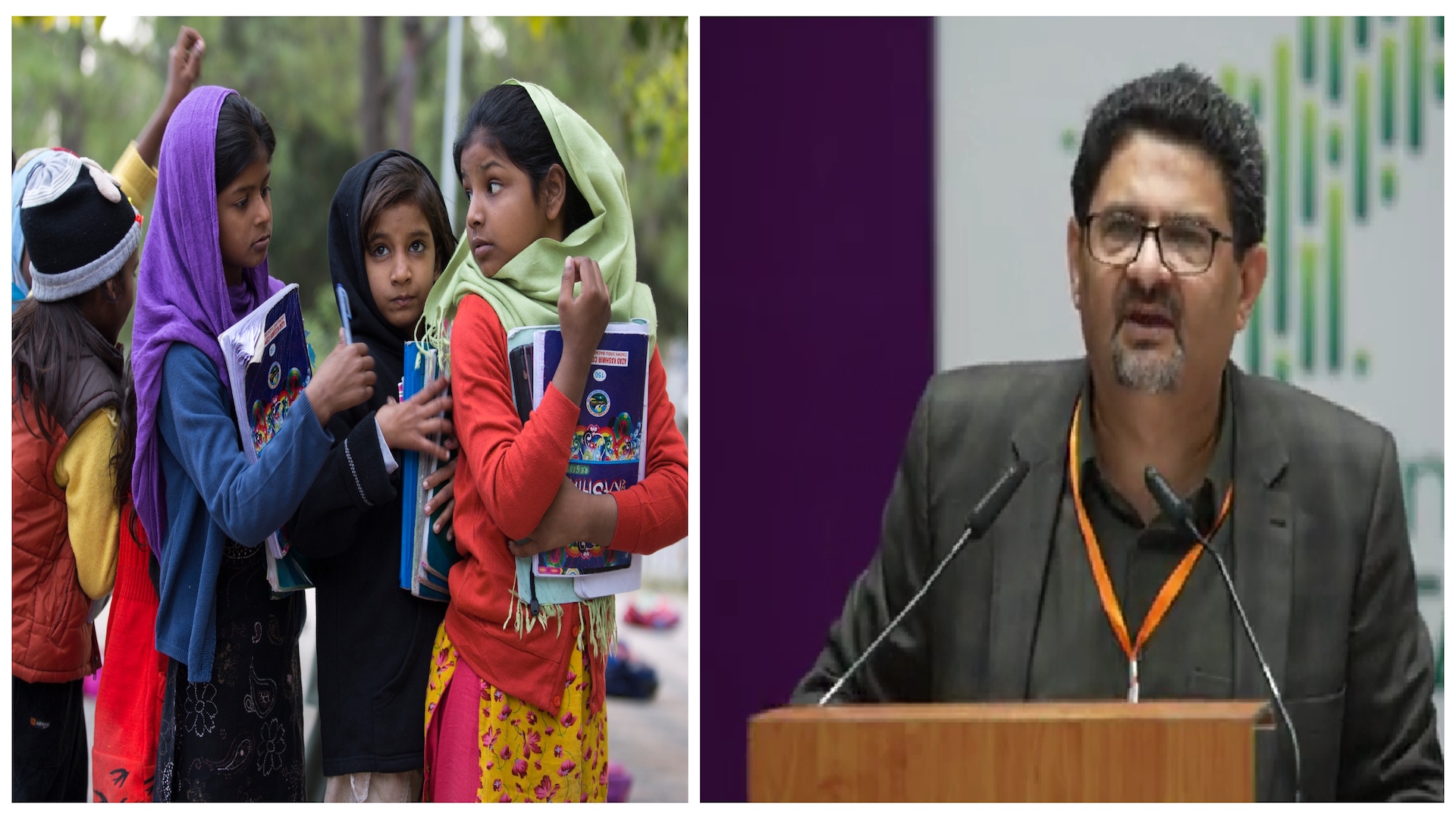This article is part of a series titled “Is there a way forward for Pakistan?” Read more about the series here.
Should the market or should the state play a role in the provision of education in Pakistan? The question may sound rhetorical to anyone who adheres to a rights-based approach and understands that education is not some commodity to be capitalized, but a right – a fundamental right in and of itself, guarantying access to which is the state’s central duty towards its people. We don’t go around seeking enforcement of other fundamental rights from the private sector, do we? When we seek fundamental right to vote, to work, to live, to liberty, to speak, to fair trial etc, we seek them all from the state. How can we then treat the right to education any differently?
In the past few days, we have seen neoliberal voices in Pakistan contextualizing education in terms of efficiency under a market lens. It started with former finance minister Miftah Ismail’s comment wherein he stated that money spent by provincial governments on school education would better be utilized if vouchers worth a set amount per child be distributed to the parents instead so ‘they’ could educate their own child(ren).
Rather than provincial governments spending around Rs 1000 bn on school education, enrolling only a quarter of our kids, and failing the average child in both math & science, I suggest we give the same amount (Rs 3000) per child per month to the family to educate their own kids. pic.twitter.com/y9QPXFvbik
— Miftah Ismail (@MiftahIsmail) April 5, 2023
Many social media users were quick to point out that this was, in other words, a call for privatization of education that would have the effect of absolving the state from its primary obligation to provide free and compulsory education to children under Article 25A of the Constitution of Pakistan.
According to UNICEF, 22.8 million children remain out of school in Pakistan. This number makes up 44% of the total population of the country. Pakistan consistently features among the top five countries in the world in terms of percentage of out of school children in the world. In addition to increasing enrollment of out of school children, other challenges in terms of mobility and safe transportation to and from school, a functional school premises with basic facilities including washrooms, particularly for girls are amongst some of the structural challenges that significantly contribute to the lack of ability of children to access education.
Then there are children from stateless communities that do not have citizenship documents to access formal schooling; but even the children that do get to go to school are unable to produce satisfactory results and performance that can evidence skills such as critical thinking, analysis, competence in subjects like mathematics and science and languages. The assessments and examinations remain focused on texts with rewards for rote learning and very little room for academic freedom, innovation and development.
In addition to that, other significant challenges as identified by education reforms consultant and founder of Ibtidah for Education, Zeeba Hashmi, include amongst others, the need to make heavy investment in teacher recruitment, training, monitoring and governance and the need to make this an attractive and sustainable career choice for people to take up teaching as a profession and to strengthen and facilitate them with the requisite resources and tools while doing so – something that cannot be left to the private sector alone.
These amongst others are some of the most pressing macro level and/or policy related challenges that simply doling out money to ‘consumers’ to go and find private options cannot address. These require public policy responses as part of the state’s duty, including educational reforms in pedagogy, improved examination techniques and assessments, improved teacher training and tools and most importantly, infrastructural development that will ensure safe mobility, safe hygiene in schools enabling access to quality education for children that private sector is simply misplaced to deliver.
Thus, while it is true that Pakistan’s education sector is in need of structural and systemic reforms, outsourcing provision of education to market based actors interested in profit maximization is surely not one that would be desirable due to the implications the absence or reduction of role of state from provision of education is likely to have on the people’s right to access education as a fundamental right.
This is because (and this is very elementary) that the private sector will seek profit maximization and will not be accountable to the public at large for its decisions such as in terms of where it sets up a school and where not. Therefore, reimagining provision of schooling services in a way that leaves it to the private sector to determine these questions will run the danger of schools either not being established in areas where there isn’t a profit margin or prices being raised to an extent making them more and more inaccessible for people. The prices may also be further pushed up due to demand led factors if public sector alternatives cease to exist.
Any bid to reimagine Pakistan’s education sector policies must not overlook the state’s central role and duty in ensuring and guaranteeing this right to the people.
In addition to the obvious challenges such a proposal would have on children and their right to access education, Summaiya Zaidi, a researcher, also rightly raised questions about the teachers and the staff in public schools that would be at risk of unemployment as a result of any such deflection of responsibility by the public sector.
Even in the most developed of economies, school education is not wholly privatized, and the state continues to ensure provision of education to the public through its own channel because they understand that it cannot be thought of as a commodity to be accessed only by those who can afford it.
Illiteracy and an untrained workforce would be a liability for the state and could lead to increased crime in a society. The provision of education as a service delivery is therefore, not just a matter of an individual child’s right but also important for overall security, growth and well-being of society as whole.
In Pakistan however, it seems public service provisions will soon be replaced by cash transfers to buy privatized healthcare and education as a matter of policy as academic Hassan Javaid warned in his tweet.
Therefore, it is very important to understand why this is undesirable and how it is problematic to think of the same quick fix for education that is used for services that are often thought of as commodities. Education is not steel, paper or a tangible product/good. Education is a fundamental right and an end in itself and not just a means to an end and all people should be able to access a fundamental right without discrimination or their ability to pay for it. Therefore, the private sector cannot be substituted for the public sector given the fundamental difference between the supposed priorities of both: One seeks profit maximization while the other seeks social benefit and is run on taxes so it owes the people certain duties among which provision of and access to education is one.
This does not mean that we should turn a blind eye to the challenges and shortfalls of our public sector education system and how that has failed to enroll children and produce qualified graduates that are able to effectively contribute to the society. Neither does this mean that private schools should be disbanded.
In most countries, private schools continue their operations despite provision of quality basic schooling by the public sector so by all means, this is not an argument to choose one entire sector over the other and vice versa.
Likewise, it would be over simplistic and frankly even escapist to deflect the provision of education to private sector alone simply because addressing the actual structural and systemic reforms in the public education sector seems like a long-term, tedious and onerous process the weight of which the policy makers appear no longer willing to take.
As Ali Malik lamented in his tweet, “if the state has given up on fixing the public-school system, what is the state for? Even police distribute pamphlets asking shops to hire their own security. Annul all taxes, roll back the state fully then!”
While Pakistan is in a political crisis, an economic meltdown and has socio-economic indicators that scream nothing but incompetence, historical injustices and discrimination that have resulted in the highest number of children in the region that are today out of school. Those in schools also are unable to compete or clear basic science and math. Any bid to reimagine Pakistan’s education sector policies must not overlook the state’s central role and duty in ensuring and guaranteeing this right to the people.
The solution is not privatization that would further curtail the access of this right for the masses but more public spending on fixing the structural and systemic issues including governance challenges, teacher training and recruitments and creating a system that is based on pluralistic values, hones transferable skills, is technology centric and globally competitive.
To begin with, the education ministry must be headed by an educationist. Qualified people and subject experts must work in the ministry for effective and desirable policy outcomes as suggested by renowned educationist Taimur Bandey. Secondly, it is crucial that political, ideological and theocratic influences on education and curriculum be retired in favour of pedagogical goals and outcomes. This is where the state can shift its policy if it is serious in addressing the challenges of our education sector. Thus, the one place where the state’s role should be diminished is in dictation of ideology through curriculum. That for sure needs to be minimized as far as possible and propagandist and populist projects imposing singular narratives on our diverse people should be confined to history never to be resurrected.
To conclude, the less the interference with substance but the more the role of state in provision of access to schools with facilities, teachers, tools and resources at par with global standards is really the key to the education quagmire. Allowing space for research with academic freedom, production of quality textbooks by independent and qualified authors and access to other learning resources including digital resources need to be ensured by the state and the digital divide needs to be reduced. These, as we have known all these years, are better prospects for spending the education budget on – as opposed to any voucher scheme that deflects the state’s responsibility to provide free and compulsory education under the constitution.

The writer is an independent researcher and a diversity and inclusion advocate. She tweets at @NidaUsmanCh

